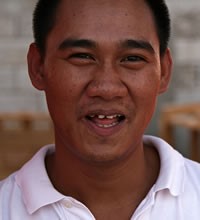Filipino, Tagalog in Malaysia

Photo Source:
MySabah.com
Used with permission
|
Send Joshua Project a map of this people group.
|
| People Name: | Filipino, Tagalog |
| Country: | Malaysia |
| 10/40 Window: | Yes |
| Population: | 531,000 |
| World Population: | 40,052,100 |
| Primary Language: | Tagalog |
| Primary Religion: | Christianity |
| Christian Adherents: | 92.00 % |
| Evangelicals: | 12.00 % |
| Scripture: | Complete Bible |
| Ministry Resources: | Yes |
| Jesus Film: | Yes |
| Audio Recordings: | Yes |
| People Cluster: | Filipino, Central |
| Affinity Bloc: | Malay Peoples |
| Progress Level: |
|
Introduction / History
The Filipinos are people from the Philippines and constitute one of the largest migrant groups in Malaysia. They reside both in Peninsular and East Malaysia, predominantly in the urban areas. Due to their country's poor economic situation, they entered Malaysia hoping to earn sufficiently to provide basic necessities for their families back home and to have a better life.
Since they came from different parts of the Philippines, they speak different dialects. Even for those who have obtained Malaysian citizenship, they still speak their own dialect whenever they meet someone of the same people group. The most common dialect is Tagalog, the Philippine national language.
What Are Their Lives Like?
Tagalog speaking Filipinos in Malaysia are involved in various occupations. The majority work as contract workers in different parts of Malaysia, but some have settled in and married the locals. Those who have obtained Malaysian citizenship are able to work in the private sector and are often involved in trading. Migrant workers are mostly factory workers, domestic helpers, entertainers, teachers or professors in schools and universities, furniture makers, construction workers, and professionals in medical or engineering field.
Divorce is common among migrant workers since they are separated from their families for long periods of time. Most of them have not been legally divorced in the Philippines. But there are those who have remained faithful to their spouses back home.
During their free time or day off, they meet friends in churches, rented houses, or in some recreational areas. They love to chat, talk about the latest news or gossip, cook traditional food and eat together.
What Are Their Beliefs?
Their religion is Christianity, usually Roman Catholicism. They commonly incorporate pre-Christian beliefs into the church. Some believe in traditional healers/herdsmen called "Albularyo" who heal them from their illnesses. Many also believe in mythical creatures like aswang, multo and maligno.PRGRPHThere is also a strong Bible-believing community among Tagalogs.
What Are Their Needs?
The Filipino government tries to help its people obtain jobs in other parts of the world, and this has allowed billions of dollars to come back to the Philippines from overseas workers. However, this needs to be balanced with worker rights; the needs of f
Prayer Points
Pray that local believers will help meet the needs of the unemployed Filipinos.
Pray that those who are without work will turn to the Truth for help.
Pray for Tagalogs to focus their faith and devotion on Jesus Christ, the only savior.
Pray for them to become a major sending base to Muslims.
Pray that soon Tagalog disciples will be making more disciples.